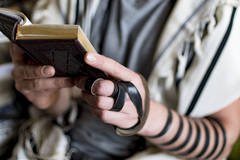President's Message 7/30/22
| Author | |
| Date Added |
Dear friends,
This week's two Parshiot, Matot and Massei, bring the Book of BaMidbar to a close. The Parshiot relate the laws of vows, the victory of the Israelites over Midianites, the request by the tribes of Reuben, Gad and half of Menashe to settle outside of the Holy Land, a summary of 40 years of wandering, creating cities of refuge, and the marriages of the daughters of Zelophehad.
When the tribes of Reuben and Gad ask Moshe for the lands to the east of the Jordan, Moshe is initially angry. He berates the tribes for cowardice and selfishness for not fighting for the land of Israel with the rest of the Nation. He feels they are abandoning the prophecy for the Israelites to conquer and dwell in the Land ofIsrael. Once the tribes explain that they would join together in unity with the rest of the Nation to fight common foes, his anger abates and he promises them the land east of the Jordan in perpetuity.
Rabbi Mirwis brings several commentators to explain why Moshe's view changes so completely. While he quotes the Ramban and the Netziv, his favorite commentator here is the Degel Machane Ephraim. He explains that Moshe was initially concerned that the tribes would go off on their own and split the nation. But Moshe took the time to understand these tribes. He then lived up to the standard of a great, enlightened leader, reversing his objections in light of this new insight.
The Degel Machane Ephraim notes that the tribes asked to settle in the East, but offered to join, even lead, the Israelites as one nation against the armies of the Canaanites. He also notes that the tribe of Menashe, straddling both sides of the Jordan, allowed constant interactions between the nation in the West and the tribes in the East. As long as the tribes worked together against common obstacles, Moshe had nothing to fear.
These Parshiot are always read around Tisha B'av, when the concept of Sinat Chinam, causeless hatred and senseless divisions, is highlighted as the underlying cause of the destruction of the Temple. Rabbi Mirwis relates this here. He praises Moshe for recognizing the importance of communication and prioritizing building and maintaining bridges to promote unity over personal pride and preference. Full dvar is here.
• • •
Many topics were covered at the Board meeting this week. The minutes from the previous meeting were approved, and they will be sent out to the membership next week. Job descriptions for office manager and building manager to take some of the load off the Rabbi and Shternie were approved and candidates are actively being recruited. Job descriptions for the leadership roles in the Shul (Rabbi, President, Gabbai) continue to be refined and will hopefully be approved before the next meeting. A code of conduct was approved by the Board and a copy will be sent to all members next week.
I'm really excited about a new monthly lecture series entitled Israel – Conflict and Culture that will begin after the Chagim and run through May 2023. Speakers are being confirmed this summer.
In addition to the minutes, I plan to send an interim budget so members can see where we are at the midpoint of the year in terms of expenses, income and expectations.
Lastly, I hope everyone can join us for the Daf Yomi Siyum BBQ for tractate Yevamot that will take place on Sunday at 2PM at the Shul backyard.
Wishing you all a meaningful and peaceful Shabbat Shalom,
Steven Inker
Mon, October 20 2025
28 Tishrei 5786
Today's Zmanim
| Alos Hashachar | 5:51am |
| Earliest Tallis | 6:22am |
| Netz (Sunrise) | 7:12am |
| Latest Shema | 9:56am |
| Zman Tefillah | 10:51am |
| Chatzos (Midday) | 12:40pm |
| Mincha Gedola | 1:08pm |
| Mincha Ketana | 3:52pm |
| Plag HaMincha | 5:00pm |
| Shkiah (Sunset) | 6:09pm |
| Tzais Hakochavim | 6:50pm |
| More >> | |
Follow Congregation B'nai Avraham's Social Media channels
 If you're on Social Media, follow our shul.
If you're on Social Media, follow our shul.
__________________________
•YouTube (Bnai Avraham)
__________________________
•WhatsApp Daily/Main Minyan
•WhatsApp Hasgacha Minyan
•WhatsApp General Chat
•WhatsApp Sisterhood
To join any of the above WhatsApp groups, write to request an invite: Shternieraskin@gmail.com
__________________________
•WhatsApp Daf Yomi
To join the Daf Yomi group, write to request an invite:
__________________________
Click here to read some of what the Rebbe said about the use of technology in spreading words of Torah.
Jewish News Links
These external news links provide general information and their listing here in no way implies an endorsement.
Brooklyn News Links
These external news links provide general information and their publication here in no way implies an endorsement.
Candlelighting Times
B'nai Avraham is your Brooklyn Heights shul
117 Remsen St
Between Clinton and Henry
streets in Brooklyn Heights
Shabbos

FRIDAY Mincha and Kabbalat Shabbat/Maariv): 7 pm during the summer
SATURDAY: Shacharit 8 am and 10 am
Mincha/Maariv: at candellighting time
[Note: a single Shabbos Shacharit minyan at 9 am takes place yom tovim, shabbatons, smachot, US holiday weekends, and summer from Independence Day through Labor Day. ]
KIDDUSH THIS WEEK is sponsored by Ed and Julie Rubinchik, in honor of Joshua’s graduation from Tulane. Yippee-ay-yay and mazal tov!
And Kiddush next week is sposored by Marty Baumrind, in honor of his mother‘s 95th birthday. It falls on Tisha B'Av on both her Hebrew and English birthdays this year, quite unusual. Thanks very much, Marty!
Weekday Minyanim

.
.
To receive timely weekday minyan updates, please join the WhatsApp group. Write office@bnaiavraham.org to join.
SHACHARIS
Monday to Friday: 7:45 am
Sunday: 8:45 am
MINCHA/MAARIV:
Sun: at candle-ighting time
Monday thru Thursday: 8 pm
Let's Learn! Classes this week at CBA
Schedule subject to change
•Sunday 11:00 am
The David Berg Lecture Series
Perkei Avot study with Rabbi Aaron Raskin. In person and on Zoom.
Meeting ID 217 795 2137. Passcode 06355
•Monday 8:15 pm
Halacha with Rabbi Yankel Raskin (in person). Email heightsrabbi@gmail.com for more information.
•Monday 8:30 pm
Daf Yomi (on Google Meet)
For link write: Mark_Zelcer@gmail.com
•Tuesday 8:15 pm
Parsha with Rabbi Hubner, in person and click here for Zoom.
•Wednesday 9:15 am
Parsha class for women
with Rabbi Raskin.
In person or on Zoom:
Meeting ID 217 795 2137.
Passcode 06355
Thursday 9:30 am
Maamar: Chassidic DIscourses on the upcoming holidays
Meeting ID 217 795 2137.
Passcode 06355
Thursday 8:30 pm
Daf Yomi (see Monday)
•Saturday 9:30 pm
Daf Yomi (see Monday)
Join Our Mailing List
Stay in touch with the shul. Choose what communications you'd like to receive.




